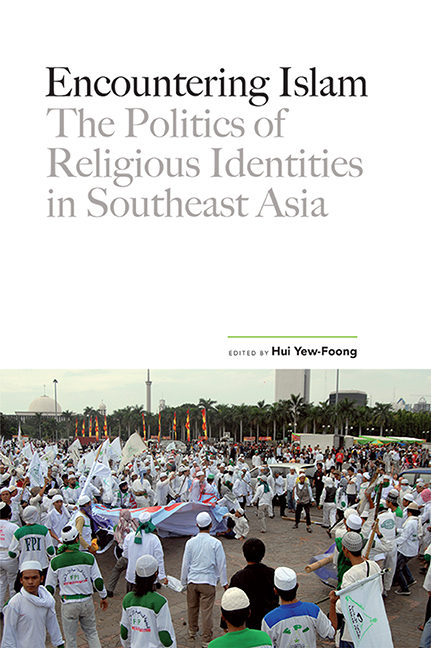1 - Introduction — Encountering Islam
from Part I - Introduction
Published online by Cambridge University Press: 21 October 2015
Summary
This volume evolved out of a conference with the theme “Religion in Southeast Asian Politics: Resistance, Negotiation and Transcendence”, held on 11–12 December 2008. Part of the proceedings of the conference has been published in a Special Focus Issue of Sojourn: Journal of Social Issues in Southeast Asia (April 2010), with the theme “Religion and Politics in Southeast Asia”, edited by Terence Chong. The articles that are related to the politics of Islam or the politics of religion in countries where Islam is the dominant religion are collected in this volume. Along the way, other chapters that fill the gap in terms of pertinent issues related to the theme of the volume were also commissioned.
The premise for the conference was the observation that, religion, whether institutionalized or otherwise, has an uncanny tendency to intervene in the political life of nation-states from time to time. The conference sought to address the following questions:
How is it that religion, which ostensibly espouses transcendental worldviews, cannot seem to avoid intervening in the profane world of politics? Can the boundary between religious and political space be clearly marked, or is it bound to be constantly negotiated and transgressed? How do we account for and characterize the potential of religion to transcend both the authority and boundaries of the state?
In raising these questions, there are two implicit assumptions. First is the assumption that what religion is is apparent. This is not the case. In fact, the more we reflect on the question, “What is religion?”, the more the concept becomes intractable (see de Vries 2008). Is it to be defined as a set of beliefs, a worldview, cosmological orientation, and/or ontological disposition articulated through rituals and institutions? Clifford Geertz, in defining religion as a “system of symbols” (1973, pp. 90, 125), was limited to introducing an anthropological approach to the study and understanding of religion rather than defining the concept. It does not say how this “system of symbols” is different relative to other systems of symbols. It also does not account for motivations that are yet to be signified within such a system.
- Type
- Chapter
- Information
- Encountering IslamThe Politics of Religious Identities in Southeast Asia, pp. 3 - 14Publisher: ISEAS–Yusof Ishak InstitutePrint publication year: 2012



